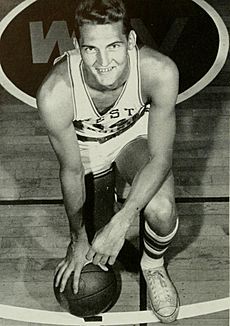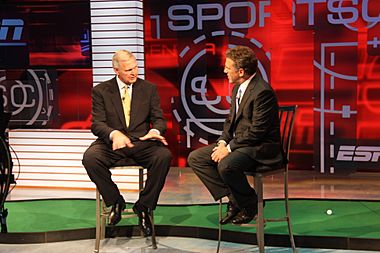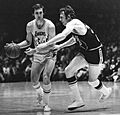Jerry West facts for kids
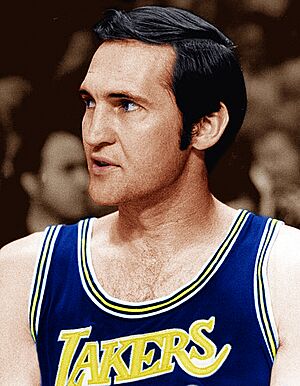
Jerry West in 1972
|
||||||||||||||||||||
| Personal information | ||||||||||||||||||||
|---|---|---|---|---|---|---|---|---|---|---|---|---|---|---|---|---|---|---|---|---|
| Born | May 28, 1938 Chelyan, West Virginia, U.S. |
|||||||||||||||||||
| Died | June 12, 2024 (aged 86) Los Angeles, California, U.S. |
|||||||||||||||||||
| High school | East Bank (East Bank, West Virginia) |
|||||||||||||||||||
| Listed height | 6 ft 3 in (1.91 m) | |||||||||||||||||||
| Listed weight | 175 lb (79 kg) | |||||||||||||||||||
| Career information | ||||||||||||||||||||
| College | West Virginia (1957–1960) | |||||||||||||||||||
| NBA Draft | 1960 / Round: 1 / Pick: 2nd overall | |||||||||||||||||||
| Selected by the Minneapolis Lakers | ||||||||||||||||||||
| Pro career | 1960–1974 | |||||||||||||||||||
| Coaching career | 1976–1979 | |||||||||||||||||||
| Career history | ||||||||||||||||||||
| As player: | ||||||||||||||||||||
| 1960–1974 | Los Angeles Lakers | |||||||||||||||||||
| As coach: | ||||||||||||||||||||
| 1976–1979 | Los Angeles Lakers | |||||||||||||||||||
| Career highlights and awards | ||||||||||||||||||||
As player:
As executive:
|
||||||||||||||||||||
| Career statistics | ||||||||||||||||||||
| Points | 25,192 (27.0 ppg) | |||||||||||||||||||
| Rebounds | 5,366 (5.8 rpg) | |||||||||||||||||||
| Assists | 6,238 (6.7 apg) | |||||||||||||||||||
|
Medals
|
||||||||||||||||||||
Jerome Alan West (born May 28, 1938 – died June 12, 2024) was an American basketball legend. He was a player and later an executive for teams in the National Basketball Association (NBA). He is often called "the Logo" because his picture is used for the official NBA logo. People also called him "Mr. Clutch" because he was amazing at making important shots when the game was on the line. One famous shot was a 60-foot basket that tied a game in the 1970 NBA Finals!
Jerry West started his basketball journey in high school and college in West Virginia. He led the Mountaineers to the 1959 NCAA championship game. Even though his team lost, he was named the Most Outstanding Player of the tournament. After college, he played for 14 years with the Los Angeles Lakers. He also helped the 1960 U.S. Olympic team win a gold medal. In 2024, he was honored for his work as an executive and consultant in basketball.
West had a very successful NBA career. He was chosen for the NBA All-Star Team 14 times and won the All-Star MVP award in 1972. That same year, he won his only NBA championship as a player. He holds the NBA record for the highest points per game in a playoff series, with 46.3 points. He was also known for his strong defense, being named to the NBA All-Defensive Team five times. West played in nine NBA Finals, and he is the only player ever to win the Finals MVP award even though his team lost (in 1969). He was inducted into the Naismith Basketball Hall of Fame in 1980 and was named one of the 50 Greatest Players in NBA history in 1996.
After playing, West coached the Lakers for three years, leading them to the playoffs every time. He then became the general manager of the Lakers and helped them win six championships. Later, he worked for the Memphis Grizzlies and helped them reach the playoffs for the first time. He won the NBA Executive of the Year Award twice for his great work.
Contents
Growing Up and High School Basketball
Jerry West was born on May 28, 1938, in Chelyan, West Virginia. His family was not rich, and his father worked in a coal mine. Jerry was the fifth of six children.
When he was young, Jerry was outgoing. But after his older brother, David, died in the Korean War, Jerry became very shy. He was also small and weak, so he had to get vitamin shots. To avoid injuries, he was kept away from children's sports.
Jerry loved basketball. He spent hours shooting hoops in his backyard, even in mud and snow. He would shoot from every angle, sometimes staying out so late his mother would be upset.
West went to East Bank High School from 1952 to 1956. At first, his coach benched him because he wasn't tall enough. But the coach taught him about being in good shape and playing strong defense. Jerry learned these lessons well. He grew to be 6 feet tall and became the team's starting small forward.
He quickly became one of the best high school players in West Virginia. From 1953 to 1956, he was named All-State. In 1956, he was named All-American and West Virginia Player of the Year. He was the first high school player in the state to score over 900 points in one season, averaging 32.2 points per game. Jerry's mid-range jump shot was his special move, and he used it to score even when defenders were close. He led East Bank to a state championship on March 24, 1956. After that, East Bank High School would change its name to "West Bank High School" every March 24th to honor him!
College Career at West Virginia University
After high school, over 60 universities wanted Jerry West to play for them. He decided to stay in his home state and attend West Virginia University (WVU).
In his first year (1956–57), Jerry played on the WVU freshman team, which won all 17 of its games. In his first year on the main team, he scored 17.8 points and grabbed 11.1 rebounds per game. He played in all 28 games and shot very well. These great performances earned him many awards, including being named an All-American.
During his junior year (1958–59), West scored 26.6 points and grabbed 12.3 rebounds per game. He set a record in the NCAA tournament by scoring 160 points in five games (32 points per game). He led all players in scoring and rebounding in every West Virginia game. Even though his team lost in the 1959 NCAA championship game, West was named the Most Outstanding Player of the Final Four. He also won other awards and helped the U.S. Pan American Games basketball team win a gold medal. In one game, he broke his nose but kept playing, scoring 19 points in the second half to lead WVU to a big win.
In his final college season (1959–60), West had his best year, scoring 29.3 points, grabbing 16.5 rebounds, and making 134 assists. He won more awards, including Southern Conference MVP. He had 30 games where he scored double-digits in two different stats (like points and rebounds). In his college career, West scored 2,309 points and grabbed 1,240 rebounds. He averaged 24.8 points and 13.3 rebounds per game. He still holds 12 WVU records. West also helped the U.S. men's basketball team win the gold medal at the 1960 Summer Olympics.
Professional Career with the Los Angeles Lakers
Starting Strong (1960–1964)
Jerry West was picked second in the 1960 NBA draft by the Minneapolis Lakers. Soon after, the team moved to Los Angeles and became the Los Angeles Lakers. West's college coach, Fred Schaus, also became the Lakers' coach. He decided West would play as a guard, even though he played forward in college.
The Lakers already had a star player, Elgin Baylor. West quickly showed his talent, scoring 17.6 points, grabbing 7.7 rebounds, and making 4.2 assists per game. He was known for his strong defense and amazing vertical jump. He worked incredibly hard, spending extra hours practicing. The NBA called Baylor "Mr. Inside" (for scoring close to the basket) and West "Mr. Outside" (for his long-distance shots). West was chosen for his first of 14 NBA All-Star Games.
In his second NBA season (1961–62), Baylor was often away due to military service. West stepped up as the team leader, averaging 30.8 points, 7.9 rebounds, and 5.4 assists. He scored a career-high 63 points in one game! He became famous for making important shots late in games, earning him the nickname "Mr. Clutch."
The Lakers made it to the 1962 NBA Finals against the Boston Celtics. This was the start of a huge rivalry. In Game 3, West tied the game with a running layup at the buzzer. The series went to Game 7, where the Lakers lost a close game in overtime. This was a tough loss, but it showed how exciting the Lakers-Celtics rivalry would become.
In the 1962–63 season, West played well again, but he missed many games due to a hamstring injury. The Lakers reached the finals again, but lost to the Celtics once more. In the 1963–64 season, West became the Lakers' top scorer, but the team struggled and lost in the first round of the playoffs.
Leading the Lakers (1964–1968)
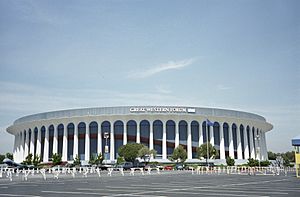
In the 1964–65 season, West averaged a career-high 31.0 points. In the playoffs, his teammate Elgin Baylor got a serious knee injury. West took over and played amazingly, scoring 49, 52, 44, 48, and 42 points in five games against the Baltimore Bullets. He averaged 46.3 points per game in that series, which is still an NBA record! However, the short-handed Lakers lost to the Celtics in the 1965 NBA Finals.
The 1965–66 season saw West average another career-best 31.3 points. The Lakers again met the Celtics in the 1966 NBA Finals. The series went to a thrilling Game 7. West and Baylor struggled with their shooting early on, and the Lakers fell behind. They fought back, but the Celtics held on to win, denying West another championship.
Injuries limited West in the 1966–67 season, and the Lakers had a disappointing year. In the 1967–68 season, the Lakers moved to a new arena, The Forum. West played fewer games due to injury, but the team won 52 games. They reached the 1968 NBA Finals for another showdown with the Celtics. West played through a sprained ankle, but the Celtics won the series again.
The Arrival of Wilt Chamberlain (1968–1971)
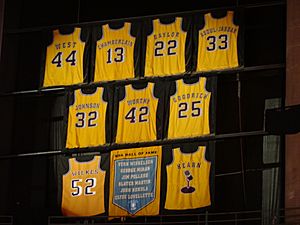
In 1968, the Lakers made a huge trade, bringing in superstar Wilt Chamberlain. This created a "Big Three" with West, Baylor, and Chamberlain. However, there was tension between Chamberlain and the coach. West was used to playing on teams with good chemistry, and the locker room problems affected his play. Still, he was named to the first-ever All-Defensive Team.
In the 1969 NBA Playoffs, the Lakers reached the finals against the Celtics for the sixth time in eight years. West was incredible, scoring 53 points in Game 1 and 41 in Game 2. He led all players in scoring during the series. But in Game 5, he seriously pulled his hamstring. A limping West played through the pain in Game 6 and 7. In Game 7, the Lakers lost a very close game, 108–106. Despite the loss, West had an amazing game with 42 points, 13 rebounds, and 12 assists. He became the only player from a losing team to win the NBA Finals MVP Award.
In the 1969–70 season, Wilt Chamberlain was injured for most of the year. West stepped up again, leading the NBA in scoring with 31.2 points per game. He also made the All-Defensive First Team. The Lakers reached the 1970 NBA Finals against the tough New York Knicks. In Game 3, with seconds left, West made an incredible 60-foot shot to tie the game! Even though the three-point line didn't exist yet, it was one of the greatest shots ever. However, West injured his hand in overtime, and the Knicks won the game. The series went to Game 7, where the Knicks won, despite West's efforts with injured hands.
In the 1970–71 season, West averaged 26.9 points and 9.5 assists. The Lakers lost Elgin Baylor to a career-ending injury, and West himself injured his knee. The team lost in the Western Conference finals.
Finally a Champion (1971–1974)
Before the 1971–72 season, West thought about retiring because of all his injuries and losses. But the Lakers hired a new coach, Bill Sharman. The team had an amazing season, winning an incredible 33 games in a row! They set a record with 69 wins in the regular season. West contributed with 25.8 points and led the league with a career-high 9.7 assists per game. He was named All-Star, All-NBA, and All-Defense First Teamer, and won the 1972 All-Star Game MVP.
In the playoffs, the Lakers swept the Chicago Bulls and then beat the Milwaukee Bucks. In the 1972 NBA Finals, they faced the New York Knicks again. Even though West struggled with his shooting in some games, the team worked together. In Game 5, West scored 23 points and had 9 assists, helping the Lakers win the game and the NBA championship! It was West's first NBA title, and he was thrilled. He said, "I played terrible basketball in the Finals, and we won... Maybe that's what a team is all about."
In the 1972–73 season, West focused more on being a playmaker, averaging 8.8 assists per game. The Lakers won 60 games and reached the 1973 NBA Finals again, facing the Knicks. West injured his hamstrings in the series, and the Lakers lost to New York.
The 1973–74 season was West's last as a player. He was 36 years old and still played well, averaging 20.3 points. He also had 2.6 steals and 0.7 blocks per game (new stats at the time). He was chosen for his final All-Star Game. The Lakers lost in the playoffs, and West retired due to disagreements about his contract. He had scored more points than any other Laker in team history.
Coaching Career
Los Angeles Lakers (1976–1979)
After retiring as a player, Jerry West became the coach of the Los Angeles Lakers in the 1976–77 season. He coached the team for three years, leading them and star center Kareem Abdul-Jabbar to a winning record of 145 wins and 101 losses. The Lakers made the playoffs all three seasons he coached and reached the Western Conference finals in 1977.
Executive Career
Building Dynasties with the Lakers (1979–2000)
After coaching, West worked as a scout for three years. Then, in 1982, he became the general manager of the Lakers. West helped build the famous "Showtime" Lakers dynasty of the 1980s. This team won five championships (1980, 1982, 1985, 1987, and 1988) with stars like Magic Johnson, Kareem Abdul-Jabbar, and James Worthy.
In the 1990s, West rebuilt the team. He traded for young talent like Kobe Bryant in 1996 and signed superstar Shaquille O'Neal as a free agent that same year. He also brought in legendary coach Phil Jackson in 1999. West left the Lakers in 2000, but he had set up the team for three more championships from 2000-2002. In 1995, he won his first NBA Executive of the Year Award for his amazing work.
Memphis Grizzlies (2002–2007)
In 2002, West became the general manager of the Memphis Grizzlies. He wanted a new challenge, saying he wanted to help a team that hadn't had much success. He helped turn the Grizzlies into a playoff team, making smart moves with players like Pau Gasol and signing coach Hubie Brown. West won his second NBA Executive of the Year Award in 2004. He retired from the Grizzlies in 2007.
Golden State Warriors (2011–2017)
In 2011, West joined the Golden State Warriors as an executive board member. He helped the Warriors win their first championship in 40 years in 2015. This was the seventh championship he helped a team win as an executive. He won his eighth championship with the Warriors in 2017.
Los Angeles Clippers (2017–2024)
After helping the Warriors win another championship, Jerry West joined the Los Angeles Clippers in 2017 as an executive. He said leaving the Warriors was sad, but he was excited for a new challenge.
Jerry West's Playing Style
West was a very complete basketball player. He could play as a point guard (who sets up plays) and a shooting guard (who scores a lot). He was great at both offense and defense. He had a super fast jump shot and was known for making clutch shots late in games.
Because he played forward earlier in his career, West was also good at getting rebounds. He had long arms, quick hands, and strong defensive skills. He was one of the best at stealing the ball and blocking shots among guards. When the NBA started All-Defensive Teams in 1969, West was on every one until he retired.
People were most impressed by how hard West worked. He practiced constantly and was rarely satisfied with his own performance. Even after a game where he scored 44 points, had 12 rebounds, 12 assists, and 10 unofficial blocked shots, he said, "Very rarely was I satisfied with how I played."
Jerry West's Legacy
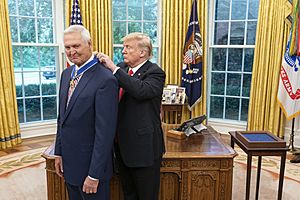
Jerry West finished his playing career with 14 All-Star selections, 12 All-NBA Team selections, and five All-Defensive Team selections. He scored 25,192 points, made 6,238 assists, and grabbed 5,366 rebounds in 932 games. This means he averaged 27.0 points, 6.7 assists, and 5.8 rebounds per game. Among retired players, only Michael Jordan, Elgin Baylor, and Wilt Chamberlain have a higher scoring average. He led the Lakers in scoring for seven seasons.
In 1979, West was inducted into the Naismith Memorial Basketball Hall of Fame. The Lakers retired his No. 44 jersey in 1983, meaning no other Laker will ever wear that number. In 2008, ESPN called West the third greatest shooting guard of all time. In 2022, The Athletic ranked him the 14th greatest player in NBA history.
As a coach, West led the Lakers to the playoffs three times. As a general manager, he won seven NBA championships, building the amazing Lakers teams of the 1980s and 2000s.
Many places honor Jerry West. In 2000, a road outside the West Virginia University Coliseum was named "Jerry West Boulevard." In 2005, his number 44 was the first basketball number retired by West Virginia University. In 2007, a bronze statue of him was placed outside the WVU Coliseum. In 2011, another statue of West was put outside Staples Center in Los Angeles. And of course, the NBA logo itself is based on his silhouette! In 2019, President Donald Trump gave West the Presidential Medal of Freedom, a very high honor.
Personal Life
Jerry West married his college sweetheart, Martha Jane Kane, in 1960. They had three sons: David, Mark, and Michael. They later divorced in 1976.
In 1978, Jerry married his current wife, Kristine "Karen" Bua. They have two sons, Ryan and Jonnie. Jonnie played basketball for West's college team, the West Virginia Mountaineers. Jonnie married professional golfer Michelle Wie in 2019.
People often described West as a shy and nervous person, but also someone with an amazing work ethic. His college roommate said West never dated in his first year. His Lakers coach remembered a time when West didn't say a word for two weeks! West was always restless. His first wife said he had trouble opening up to her. After a big loss, he would sometimes just tell her to "get out" of the car and drive away.
Early in his career, his West Virginia accent and high-pitched voice led to some teasing. Teammate Elgin Baylor nicknamed him "Tweety Bird."
West was known for his incredible mental toughness and dedication. The NBA described him as having "obsessive perfectionism" and "an uncompromising will to win." Lakers announcer Chick Hearn said, "He took a loss harder than any player I've ever known." Even before he won his first championship, rival Bill Russell said to him, "Jerry, you are, in every sense of the word, truly a champion... If I could have one wish granted, it would be that you would always be happy."
In 2011, West wrote a book about his life called West by West: My Charmed, Tormented Life. The book was very popular and became a New York Times bestseller.
Jerry West passed away on June 12, 2024, at the age of 86.
Images for kids
See also
 In Spanish: Jerry West para niños
In Spanish: Jerry West para niños


